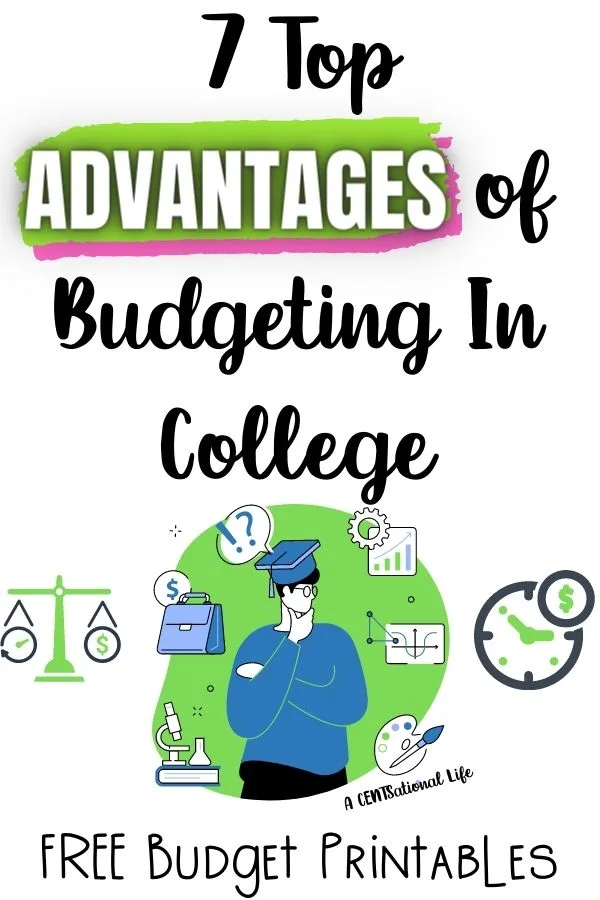Budgeting tips for college students to stay out of debt and tips to save money in college.
Use these smart personal finance tips for college students to prepare for your future with a good credit score and zero debt.

College is a time for new beginnings and new experiences.
But, it can also be a time when students start to feel the pressure of being in debt.
This stress can be avoided if students take the time to learn about personal finance and budgeting for college students.

Going to college introduces a whole new level of freedom and responsibility – especially when it comes to money.
For many young adults, this is the first time they’re completely on their own and in charge of their finances.
They need to know all of the advantages of budgeting.
It can be a lot to handle, but luckily, there are some easy budget tips for college students that can help them stay on top of their spending during their first year of college.
7 Must-Know Budgeting Tips For College Students
Estimate Expenses
There are many expenses that you will have to pay for when you go to college.
Most people get scholarships to help them with their education costs and that is a good idea.
Some people also choose to take out loans so they can afford college and then pay them back once they graduate.
To start a budget for college, first make a list of all the bills that need to be paid each month, including tuition, rent, food, transportation, and any other mandatory expenses.
Then, add in the estimated spending on entertainment, socializing, and personal care.
The cost of living in different parts of the country can vary a lot.
For example, it might be more expensive in New York City than it would be in Omaha Nebraska.
You should consider the cost of living when you make your estimate for how much money you will need for college because that is going to make a big difference in how much money you will need overall.
Once you have a good idea of the monthly expenses, you can start planning your budget.
Make A Plan For How Money Will Be Earned
Additionally, one of the must-do budgeting tips for students is actually making the plan for how you will earn that money.
It can be a regular income from a job or financial aid, but brainstorm all the options you have to make money.
You can look into some easy ways to make money from home or even how to make extra money with your phone.
A few other ideas can be freelancing, tutoring, or working online.
Freelancing is a good idea if it’s a field you already excel in, like writing or working on website design, graphics, and so on.
If you are naturally gifted in a specific subject, perhaps you can research what kind of tutoring services are offered and sign up if it pays.
And yes, most colleges and universities have this tutoring-paying option! Score!
You may even be able to make money teaching classes on Outschool.
Lastly, you can look online for any work they can do on your laptops.
Jobs like this are becoming increasingly popular for young adults and college students.
Think outside the box and find some creative ways to make extra money!
Track Spending and Stick To A Budget
One of the most important financial tips for college students is to track your spending and stick to a budget!
This can be especially challenging for college students, who may be living on their own for the first time and facing a variety of new expenses.
However, by tracking your spending and sticking to a budget, you can help avoid financial difficulties down the road.
There are a number of ways to do this.
Start by downloading our free expense tracker and write down all of your expenses and income, and figure out your college budget.
You can easily keep a detailed ledger of all your income and expenses, or you can set up a budget using software or an online app.
There are plenty of helpful apps and websites that can make this process easier, like Mint or You Need a Budget.
Budgeting for college students will help you be able to navigate your finances successfully during your first year of college.
Once you have a budget in place, it’s important to track your spending and make sure you’re sticking to it by touching base with them on it at least for the first few months of college.
These specific financial tips for college students, like budgeting and tracking your spending, are the best tips to save money in college.
Establish Credit & Use It Wisely
It’s important for college students to start building their credit, but it’s just as important to use this new-found credit responsibly.
If you’re going to use credit cards for expenditures or for the simple reason of establishing their credit, you should make sure to pay off your balance in full each month.
The best financial tip for college students using credit cards is to make sure you are only spending what you can afford to pay off each month.
Otherwise, you will end up accruing interest and fees that can add up quickly.
If you feel like you can’t trust yourself to use a credit card responsibly, it’s best to avoid using one altogether.
But there are other ways to establish and build your credit.
Instead, perhaps you can open up a simple, very small loan with your parent as the co-owner to start establishing your credit.
You can simply pay the loan back with the money you borrowed, which will help teach you money management along the way.
At some point, you do need to start your credit as a young adult if you haven’t already and be responsible for managing it.
College students need to be sure to know the importance of credit management and how it affects their future…like their forever future.
Live Below Your Means
College students need to know that just because they have money doesn’t mean they have to spend it all.
In fact, it’s often wiser to live below your means so you can save more money and be prepared for unexpected expenses for the time above.
This doesn’t mean you have to deprive yourself – be mindful of your spending and make sure you are prioritizing your needs over your wants.
The reason why this is one of the most important financial tips for college students in general is because when college students taste that new sense of freedom and independence, they won’t exactly know how far they can go or what will happen exactly if they do “cross the budget line.”
And we don’t want you to learn the lesson the hard way. Like your parents maybe did. Or was that just me?
Therefore, know the consequences of what will happen if you live ABOVE your means.
Try out some of these 50 frugal life hacks to save money and still have a life.
Also, be sure to follow and use money saving tips that trick you into saving money!
Build An Emergency Fund
Expenses for textbooks, travel and unexpected emergencies will inevitably come up, so it’s important to have a financial safety net in place.
If you’re able, start off with a savings account and stick a few bills in there to get started.
You can also invest in a 529 college savings plan, if possible.
If you already know how your income will be made, and if you already worked out the budget, you’ll be able to see what’s left over for disposable income and how much can be saved either from each check or each month.
Side note: The rule of thumb is to save 10% of every paycheck.
Once you start putting away money into a savings account, you will have some money to fall back on in case of an emergency.
Then, as you start earning more money, you can begin making plans for after college.
It’s never too early to start saving money.
I encourage all college students and young adults to start setting aside money each month for their future.
It’s never too early to start learning personal finance for college students.
If you need a little help try to have a no-spend month.
Or try an easy money-saving challenge, like a 365-day penny challenge.
Payoff or Avoid Student Loan Debt
Student loans can be a big financial burden.
All college students should avoid taking out more loans than they need by applying for scholarships and grants.
Even if you don’t even know where to begin, search the internet and go to your financial aid department to learn more.
It would be even better if you are able to make installments for college or work to pay for it as you go.
You can still make installments and work as you go and still get student loans if they’re headed to a pricier college.
But the student loan needed would be reduced, which in turn means you’ll pay back a much smaller amount. Speaking from experience here!
Once you graduate from college, if you have student loans to pay off, it’s important to start planning for that ASAP.
You can do this by budgeting for your loan payments and trying to make extra payments if possible.
You can also at least pay the interest on the student loans, which will definitely reduce the overall amount once it’s time for them to repay!
The sooner you can get your loans paid off, the better – trust me, you’ll be glad they did.
Try out some of these ways to pay student loans off quicker.
Personal Finance For College Students To Save Money
These budget tips for college students can help you better manage your money and stay on top of your budget while attending college, especially for your first year.
College is a time of great change in your life.
It can be a time of great joy and excitement, but it can also be a time of anxiety, stress, and worry when you are budgeting for college.
In order to have the best college experience possible, you will need to plan ahead and use budget tips for college students.
Just remember to start with a realistic estimate of expenses, make a plan for income, and save money where you can.
Be sure to download the free budget printables to help you get started!
Do you have additional personal finance tips for college students? Share it in the comments!

